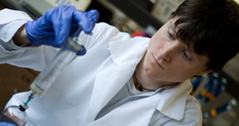Program Director: Paula E. Papanek, Ph.D.
marquette.edu/chs/pt/rehabsciencems.shtml
Degrees Offered
Master of Science; Doctor of Philosophy
Learning Outcomes
The clinical and translational rehabilitation health science master's and doctoral programs build on the knowledge and skills of a licensed post-baccalaureate trained clinician, and demands a progressive demonstration or advanced knowledge and skills related to research, teaching and professional development. The program develops research skills that will translate to clinically relevant questions.
Graduates of the master's degree in clinical and translational rehabilitation health science will:
- Contribute to an original research project.
- Demonstrate mastery of concepts in clinical and translational rehabilitation science.
- Communicate and summarize research findings to various groups including colleagues and lay public.
- Apply codes, guidelines and professional standards for the conduct of clinical and translational research.
- Demonstrate the ability to participate on a multidisciplinary team to solve clinical and translational rehabilitation science problems.
Graduates of the doctoral degree in clinical and translational rehabilitation health science will:
- Demonstrate an in-depth mastery of advanced concepts in clinical and translational rehabilitation science.
- Use effective teaching methods to provide instruction to undergraduate and graduate students.
- Communicate clinical and translational research findings and translate findings effectively to different groups of individuals including colleagues, students, the lay public and the media.
- Demonstrate independent scientific thinking.
- Apply codes, guidelines and professional standards for the conduct of clinical and translational research.
- Demonstrate the ability to design and execute an original research project (doctorate degree) including formulating a testable hypothesis, systematic review of literature, obtaining IRB animal ethical approvals, analyze, interpret and summarize results in clinical and translational rehabilitation research.
- Build and lead an interdisciplinary team that matches research objectives.
- Demonstrate responsible conduct in research.
Program Descriptions
Master of Science
The master of science degree in clinical and translational rehabilitation health science is open to those with a related science major interested in strengthening their core undergraduate major with additional course work in research and rehabilitation science.
A master’s degree may strengthen a pre-professional student’s application for entry into physical therapy, physician assistant studies, occupational therapy or medical school. A student may choose three areas of emphasis for their degree: community wellness, sports medicine or performance enhancement. Both thesis (Plan A) and non-thesis (Plan B) tracks are available.
Doctor of Philosophy
The doctor of philosophy in clinical and translational rehabilitation health science builds upon the core competencies of clinical degrees (anatomy, physiology, pharmacology, medical ethics and patient care) with course work in rehabilitation systems physiology, applied neurophysiology, statistics, molecular genetics and research methodology. Students gain extensive research experience in the Exercise, Rehabilitation and Movement Disorders Research Center housed within the exercise science program and the Department of Physical Therapy. Research includes the use of EMG, motion analysis, biomechanics, isokinetic dynamometry, fMRI, body composition, bone mineral density, diagnostic ultrasound and acute and chronic exercise training to explore mechanisms of dysfunction and develop theories for restoring function in people with movement disorders. Movement disorders cross age, gender and all ethnic boundaries and include populations with multiple sclerosis, post-traumatic stress disorder, traumatic brain injury, stroke, cancer survivors, pediatric obesity, cardiovascular diseases and chronic pain syndromes.
The Clinical and Translational Science Institute of Southeastern Wisconsin is a major partner with Marquette’s clinical and translational rehabilitation health science program. Marquette’s participation in this consortium expands opportunities for academic, medical and clinical research within Milwaukee. CTSI partner institutions include the Medical College of Wisconsin, University of Wisconsin-Milwaukee, the Milwaukee School of Engineering, the Zablocki V.A. Medical Center, Children’s Hospital of Wisconsin and Blood Center of Wisconsin.
Prerequisites for Admission
Master of Science Students
All master's applicants will need greater than a 3.000 GPA in their undergraduate work. Current Marquette exercise physiology and athletic training degree students with a 3.000 GPA or better may apply for the accelerated degree program during their junior year for admission into the master’s program for their senior year.
Doctoral Students
Students must have successfully completed either a master’s degree in a related discipline or a post-baccalaureate degree in a clinical profession (physician assistant studies, physical therapy, doctor of medicine, nursing, speech-language pathology, etc.) with a minimum cumulative GPA of 3.000 (based on a 4.000 scale) and after acceptance into the Graduate School.
Application Deadline
Master's applications are due Jan 1 and doctoral applications are due Feb 15 of the year students wish to begin study. Students typically begin their studies for the master's degree in the summer and for the doctoral degree in the fall of each academic year.
Application Requirements
Applicants must submit, directly to the Graduate School:
- A completed online application form and fee.
- Official transcripts from all current and previous colleges/universities except Marquette.
- A curriculum vitae including work history, formal education, continuing education, licensing and certification, professional organizations, honors and awards, publications, presentations and grants.
- A personal statement of no more than 500 words addressing your purpose for applying to the program, your ability to successfully complete the program and your goals (short and long term).
- Three letters of recommendation addressing the applicant’s academic, professional, clinical, personal attributes and potential for meaningful graduate study. At least one academic reference must be included.
- GRE scores. Required for master's applicants who are not part of the Marquette ADP program; required for doctoral applicants if their graduate/post-baccalaureate clinical degree was done at a non-U.S. institution or if their graduate/post-baccalaureate clinical degree GPA is less than 3.000. Waived for current Marquette applicants with GPA above 3.000 to the ADP.
- (For international applicants only) a minimum acceptable score on the iBT TOEFL exam of 90 overall, with minimum section scores of 25 for listening and speaking, and minimum scores of 20 for reading and writing, or other acceptable proof of English proficiency.
Applicants may wish to submit one example of written work, such as a class project, course assignment, first author publication, grant application, etc. (optional).
An interview with the admission committee is mandatory.
General Information
Students applying to the doctoral program must have successfully completed either a master’s degree in a related discipline or a post-baccalaureate clinical degree (D.P.T., M.P.T., M.P.A., M.S.N., M.D., etc.) with a minimum cumulative GPA of 3.000 (based on a 4.000 scale). Applicants to the master's program will likely need a significantly higher undergraduate GPA than 3.000 in order to be competitive.
The GRE (if applicable) must have been completed within the previous six years, and official scores must be sent to Marquette University directly from Educational Testing Service.
Accelerated Degree Program
The accelerated degree program is designed for undergraduate students in exercise physiology or athletic training at Marquette University who wish to complete both their undergraduate degree as well as the master of science degree in clinical and translational health science in just five years.
Students with a GPA of 3.000 or above may apply for admission to the five-year program during their junior year. Students must submit an application to the Graduate School, indicate their interest in the five-year program, and meet all other admission criteria as stated in the Application Requirements section.
Academic Standards
A cumulative GPA of 3.000 will be required in the clinical and translational rehabilitation health science program. The Academic Regulations section of this bulletin describes the criteria and procedures for academic warnings, probation, removal of probation, and dismissal. The clinical and translational rehabilitation health science program will strictly follow these policies and procedures.
Edit "CTRH-MS"Clinical Translational Rehabilitation Health Science
The program of course work and research for the master’s degree is determined in consultation with the student’s advisory committee. Each student is advised to take such courses as are properly related to academic background and research interests. Students may choose a thesis (Plan A) or non-thesis (Plan B) track.
Clinical Translational Rehabilitation Health Science
The program of course work and research for the doctoral degree is determined in consultation with the student’s advisory committee. Each student is advised to take such courses as are properly related to academic background and research interests. A doctoral student must complete a program of study defined, in conjunction with an adviser, on an approved Doctoral Program Planning Form.
During the admission process, a total of 25 credits may be recognized and may be from the basic science foundation upon which the doctoral degree is built. Course work will be selected from topics such as advanced anatomy, physiology, microbiology, genetics, and pharmacology. Selected courses will be documented on the Doctoral Program Planning Form which must be submitted by the end of the first semester.
In addition to the course work completed prior to enrollment in the doctoral program, students may choose to complete graduate course work at partnering CTSI institutions. Once the mentor has been selected, advanced graduate electives may be chosen from any of the CTSI partner institutions (MSOE, MCW, UWM). See the Departmental Graduate Handbook for specific requirements.
Advancement to candidacy for the doctoral degree is considered following successful completion of all requirements specified on the Doctoral Program Planning Form and after passing a doctoral qualifying examination. A typical doctoral student completes a minimum required 21 credit hours of core course work, 11 credit hours in advanced electives (minimum of 3 courses), plus four courses (0 credits) of departmental seminar which would expand the student’s knowledge in research theory, statistical analysis, basic biomechanics, kinesiology principles and ethical decision making as well as exposure to research opportunities within the program. In addition, doctoral candidates will complete 12 credit hours of dissertation work. The student must submit and defend a dissertation after completing all other formal requirements for the doctoral degree.
On this page
- Degrees Offered
- Learning Outcomes
- Program Descriptions
- Prerequisites for Admission
- Application Deadline
- Application Requirements
- General Information
- Accelerated Degree Program
- Academic Standards
- Clinical Translational Rehabilitation Health Science
- Clinical Translational Rehabilitation Health Science
- Courses
Graduate School
- Admission and Readmission
- Academic Calendar
- Academic Regulations
- Academic Programs Overview
- Special Academic Programs
- Student Resources and Facilities
- Financial Aid
- Tuition, Fees and Housing
- Programs
- Biological Sciences
- Chemistry
- Clinical Psychology
- Clinical and Translational Rehabilitation Health Science
- Communication
- Counselor Education and Counseling Psychology
- Dentistry
- Education
- Educational Policy and Leadership
- Engineering
- English
- Foreign Languages and Literatures
- Graduate Professional Studies
- Graduate School
- History
- Interdisciplinary Ph.D.
- International Affairs
- Mathematics, Statistics and Computer Science
- Nursing
- Philosophy
- Physical Therapy
- Physician Assistant Studies
- Physics
- Political Science
- Religious Studies
- Social and Cultural Sciences
- Speech-Language Pathology
- Theology
- Transfusion Medicine
- Faculty and Administrators




 Warning:
Warning:








